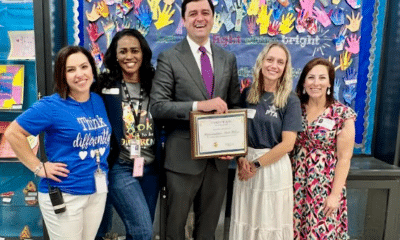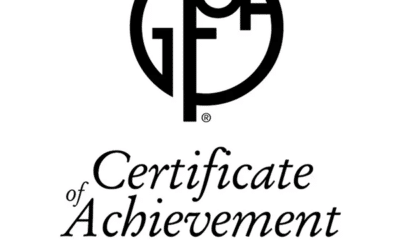Education
Wesleyan’s Chris Cleveland Talks About the Challenges of Distance Learning [Podcast]
Published
5 years agoon
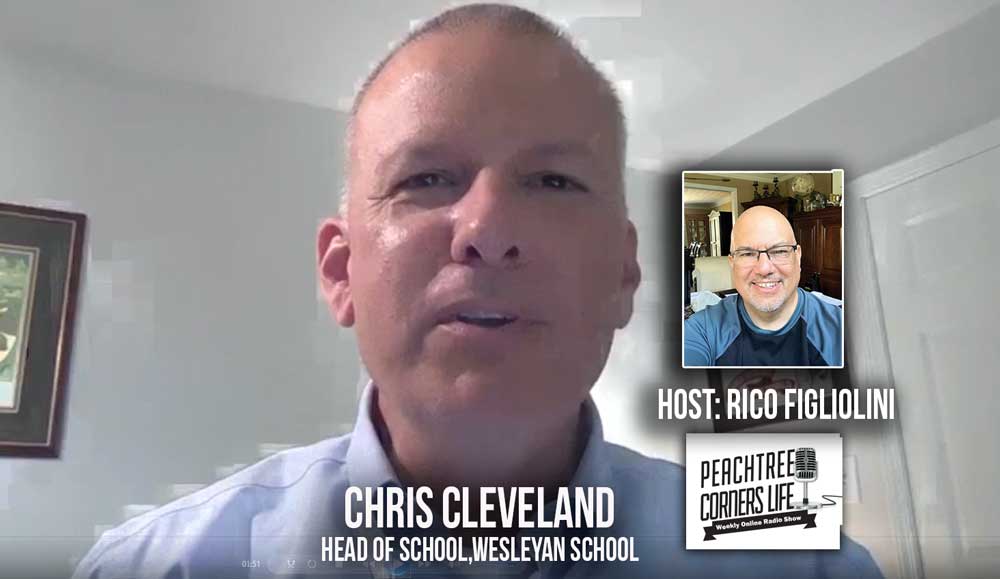
Wesleyan’s Head of School Chris Cleveland talks about distance learning in this time of COVID19 and the stress and challenges families have right now. Streamed socially safe from the City of Peachtree Corners, Georgia.
Timestamp:
[00:00:30] – Intro
[00:02:19] – About Chris
[00:05:05] – The Switch to Remote Schooling
[00:13:52] – Learning Challenges
[00:17:19] – At Home Counseling
[00:20:08] – How Sports and Arts are affected
[00:25:51] – Silver Lining
[00:31:44] – Closing
“The biggest blessing out of all of this is that it has forced their family to slow down. Many of
Chris Cleveland
them have said, I’d never realized how busy and how hectic our schedule had become, and now
that we’re forced to be at home, and many of the extra things that we’ve done have been
canceled. We now have more time together as a family.”
Podcast Transcript
Rico: [00:00:30] Hi everyone. Thanks for joining me. This is Rico Figliolini, host of Peachtree Corners Life in the City of Peachtree Corners. Been here, resident since ‘95. And these podcasts to me over the last three plus years have been a great way to meet and talk to people in the community, subject experts and just average people that they may be doing extraordinary things or certainly people that are doing the work that we all, you know, need and done in this community of, of the city. Today, I have a great guest and the head of school of Wesleyan, and his name is Chris Cleveland. Hey, Chris. How are you?
Chris: [00:01:10] How are you doing today?
Rico: [00:01:11] Great, thank you. Before we get into our interview though, I want to be able to just thank our sponsor, Hargray Fiber. They are a company in the Southeast here that deals with fiber-optics, deals with communities and business, and is very much involved actually in community outreach. And they’ve been doing a great job throughout the Southeast and certainly here in Georgia and in the Metro area and places like Valdosta and other cities. Their latest promotion is free business internet for 90 days for new customers. And for those current customers, they’re actually doubling the bandwidth because God knows we all need that. I think right now to make sure we’re streaming everyone, there’s 200 million people on zoom versus 10 million. So we’re all teleworking in one function or another, whether it’s school or business. So I want to thank Hargray Fiber for being our spot so you can find more information about them on HargrayFiber.com. So now let’s get into introducing our guest, Chris Cleveland with Wesleyan school. Hey Chris, give us a little bit a background of who you are and stuff.
Chris: [00:02:19] Great. Well, thanks Rico, and I appreciate the opportunity to be streaming live with you and the chance to talk with you a little bit. I am the head of school at Wesleyan school. It’s my 18th year as an employee of the school. I came to Wesleyan as the middle school principal and have served in a variety of administrative roles. And then now in my sixth year as head of school, my wife and I are also parents at the school. We have two sons, one who graduated last year in the class of 2019 and as a freshman in college this year. And our second son is a sophomore at Wesleyan. So we are all in on Wesleyan and we’re also proud residents of Peachtree Corners. We love living in this area. So not only do I work in Peachtree corners, but I’m a resident. I am proud to say that I’m from Peachtree Corners, love this community and the great people who live in this area. I’m actually a native of Atlanta. There’s not very many of us left, it seems like. But, born and raised here. I love this city, love this area. And, I’m so thrilled that I’ve been able to raise my boys in this area, and live here as an adult as well.
Rico: [00:03:38] Cool. It’s, certainly, you know, I think we share some of that right now. Except for the being born in Atlanta. I think most people would know from my voice. The transplanted New York in a, in a Brooklyn I had at that. But my family has grown up here. All my kids, my first of the three was nine months when we moved here. So everyone’s pretty much a Georgian to a degree. And, all through different, right. All through the public school system is where they’ve, they went through. So they did Simpson Pinckneyville Middle, Norcross High school. But, you know, with Wesleyan being right across the way, and right across the street from Norcross high
school, you know, there’s just lots of friends that kids have made along the way, and everyone either went to a public school, Cornerstone, Wesleyan didn’t matter. it’s just a great community, right, that we live here.
Chris: [00:04:33] That’s right. Yeah. We think there’s a lot of great schools in Peachtree Corners. We hope that we are one of them, but whether children go through the public school system or avail themselves of any of the other private schools in the area, this is a great place to raise children because there’s great schools and there’s tremendous community support, and that’s such a critical factor in school success. So, being a resident of Peachtree Corners provides you with a lot of great options when it comes to education.
Rico: [00:05:05] For sure. And in these challenging times too, I mean, we, I know my son has been doing digital learning days on Fridays at Paul Duke STEM high school. So he’s somewhat prepared for a five day a week digital learning. But not every school was set up that way. And, and even still, even doing it one day is way different than trying to do this five days. So I’m sure you guys have challenges that you’ve had. So maybe you can share a little bit about what that was like the first, the first week of trying to get this off the ground. How did that go?
Chris: [00:05:38] Yeah. I think for all of us who work in education, clearly this is a tremendous challenge because we’re taking a product that we deliver best face to face. And we’re trying to do it remotely. So certainly it’s been a huge transition for our teachers, but also an equally huge transition for our students and their parents. And, and I think that’s probably the first challenge is we’re dealing with. Families whose parents may be working from home now. So you could have everything from internet issues with multiple people trying to access the internet at the same time, to just simply have you establish family routines. When people are home at times they aren’t normally at home. We also have families where the parents are continuing to work. And so children are essentially getting themselves out of bed and they’re having to monitor themselves and manage their time. They might even be having to care for younger siblings. So just the change in the home life alone is a tremendous disruption too. The normal process of education. Obviously we’re trying to address technology issues. We have a fully staffed technology team that serves as our own help desk. And so they have been monitoring and working with teachers and students and parents on various technology issues and trying to address those. We’re grateful for our tech team and, and the great work that they’ve done. But I think the biggest challenge is, it’s certainly at Wesleyan school we try to pride ourselves on the personal relationship that we try to build with our students. And we’re of the belief that instruction, no matter what the subject is best delivered in the context of personal relationships. And so we’re now trying to do something that’s very personal in a format that is impersonal. So how do you do that? How do you speak into that? And I think that’s probably been our greatest challenge as an institution, is to continue to maintain strong personal relationships between teachers and students, between teachers and parents, and between students with their peers. And at the same time, still deliver education from a distance. And, I wouldn’t pretend to say that we’ve gotten it all right. We’re learning, in this process as we go. We are on our 12th day today
of distance learning, and I think we’re well ahead of where we were a week ago, and I’m confident a week from now we’ll be further ahead than where we are today.
Rico: [00:08:30] Interesting. So, you know, teaching, teaching, like anything else, learning really is a social thing, right? That’s how we look at mentors. We look at rivals within the classroom. We look at making ourselves better. Translating that online though, is that challenge, right? Do you find that there has to be more, maybe? Do you even, I mean, at this point it’s only 12 days into it, but do you see the value of one-on-one, online attraction with teacher student?
Chris: [00:08:59] Yeah, we’ve tried to have a mixed approach, certainly for students in grades 5 through 12, which for us middle school starts at fifth grade. We lean a little bit more on independent work and providing assignments for students and giving them the most flexibility we can give them to complete assignments on their own time. And to not have to do it in a timed classroom period. It’s a little more difficult with younger students, and that’s where the parents have to lean into the process more. We do things like, we have mentor groups for all of our students, and so those are not really academic groups. They’re really just meant to be times to discuss whatever the issue of the moment is. Obviously, right now, the issue of the moment is COVID-19, and the disruption to our society. So we’ve been working hard for our teachers to be able to carve out that time to meet with their mentor groups online. Our teachers offer, what we call office hours, which is an hour block at the end of the school day from two to three o’clock. Where students can check in online with their teacher and chat live with them. That sometimes is a one on one. Sometimes it’s multiple students who want to get in those chat rooms who might have the same questions. So we’re trying to go at it from a number of different angles. But Rico, one thing we’re really concerned about is too much screen time and the, the problems that can arise when children are staring at a screen all day. And so we started off our distance learning program slowly and we started more with teachers posting assignments, giving students maximum flexibility to complete those assignments, and then following up with that office hour block towards the end of the day. And as time goes on, we’re going to incorporate more and more, what we call live screen time options where teachers and students can interface at the same time with each other. But we want to do that cautiously. We’ve tried to learn from other schools who are a week or two ahead of us in the distance learning process. Because of our spring break being earlier than most schools. We were out the first week that most schools unrolled their distance learning programs. So we had the benefit of learning from people and the challenges that they faced. And one of the early challenges was that a constant screen time for teachers and students really leads to a very high level of fatigue and burnout and shut down. And so we’ve, we’ve approached it in a different way. We’ve started by slowly getting into the assignment and, and teaching process. And then over time we’re incorporating more and more live interaction, and we hope by doing it that way, we’ll be able to create a balance between live, FaceTime, and also flexible time in which students can complete their work on their own.
Rico: [00:12:10] Sure. There’s so many different options, right? You look at young kids, maybe not the sixth grade and under, or maybe some of them, but certainly the middle school and the
high school that are used to being online for a variety of reasons, right. So whether they’re, playing Minecraft and collaborating right in the process. Cause I’ve seen my kids, you know, they’d be playing Minecraft, chatting on discord, they’re collaborating about what they’re doing to build something. Not the school mix, but still right. Still part of that. So they’ve learned a little bit of how to deal with collaboration. They might be a little more ahead than we think, but you’re right, I can see the screen burnout being an issue. Bring on the too long if it’s not gamified at least.
Chris: [00:12:51] Exactly. And I think, for any of us who have been in, a series of video conference calls for, for a part of our job over the last few weeks. You know that being on four or five back to back video conference calls is exhausting in its own way. It’s hard to explain, but it leads to a level of tiredness and fatigue that is difficult to understand until you’ve gone through it. And we have the advantage of being adults. We have life experience. We have more coping mechanisms on how to deal with our own stress and anxiety and fear. children through no fault of their own because of their age. They don’t have those coping mechanisms. And so we need to be careful how much we’re pushing onto children early on in this process, and make sure that we’re not doing more damage unintentionally, of course, in the process of trying to maintain our academic standards.
Rico: [00:13:52] Yeah. I think you hit on it. I think you hit on it before a little bit and we talked about it too before we went live on this, that kids that are doing digital learning, at least in the school system, Gwinnett County school systems, the first few weeks they were putting out so much stuff that was actually more work by far than if they were right in the classroom doing, they would never cover that much work. And it took them a little while to evolve to realize that. So I’m sure this, this is somewhat of what you were touching on just before.
Chris: [00:14:24] Absolutely. I think workload is a huge issue. And, you know, Rico, one of the most important aspects of classroom education is the ability of the teacher to differentiate their instruction based on who’s in front of them. So a classroom teacher can look at a group of students and by reading their facial expression and their body language, they can figure out pretty quickly who is understanding what they’re teaching and who is not getting it. And that affords the teacher of the opportunity. In the moment to differentiate their instruction, to maybe press the pause button and allow children who clearly understand a concept to continue to work ahead and at the same time go work with a group of children who may be struggling with that concept. When we do digital or remote learning, you lose that opportunity to differentiate, differentiate your instruction. You have to, by nature of the media you have to treat all learners the same. And obviously all learners are not the same. So that is one of the great challenges and I think that’s why it’s been a struggle for all schools. Wesleyan included to find that balance point of enough work for there to be a challenge for students and to advance students and to progress through the coursework, but also not to overwhelm children with busy work in an effort to occupy their time that that’s really not the approach that, that any school is looking for at this point.
Rico: [00:16:03] I wonder, if you found that anecdotally speaking, that kids are more willing to participate online, but you might have kids more that otherwise wouldn’t in the classroom because they’re surrounded by other kids, but online because they’re in the wrong place.
Chris: [00:16:18] Yeah, I think certainly, there, there’s a level to that of, you know, without the, the social pressures of looking around and seeing who’s around you and who might be, you know, giggling if you raise your hand or who might be trying to pass you a note while you’re trying to pay attention. Certainly some of those distractions are taken off the table, but I think at the same time, what you’re seeing in this distance learning process is students who know how to manage their time and work independently. I think they’re doing much better than students who struggle with those skills. And again, some of those skills are developmental. Some of them are just how we’re born and how we’re hardwired. So students who don’t have those skills, again, that’s, that’s not a criticism or a fault or a shortcoming of theirs. It’s just that I think this remote learning brings those issues more quickly to the surface. And so I think that’s something we have to be aware of.
Rico: [00:17:19] I can see that. I mean, certainly, kids that, you know, like if my son had said, like when he, when they went to five days there where he was like, I don’t learn well this way, I’d brought be in the classroom and do this. I can’t, I can’t read third. But then again, it’s like some kids learn well by just reading the stuff and some kids don’t. So kids would rather be in the mix and doing it, and they learn and he’s a straight A student. So it’s, every child has a different way of learning and in this could be detrimental to some, but better to others, right? To manage that process, I guess. How, how does Wesleyan effect run the, you know, what’s going on in the home life? How are there any, you know, how do you, how do you work with that?
Chris: [00:18:05] Yeah. Well, certainly, we’re trying to leverage all of our resources of our counseling office, to be communicating with parents on a regular basis about the social emotional needs that children have during this time. So we’ve built a page of information for our parents where they can access all a whole host of counseling resources. Certainly our, our teachers individually, we’re encouraging them to be, checking with children and how they’re doing on a personal level. Of course, families that communicate with us, with their various struggles, whether it be with establishing a routine or if they have a family member who’s ill. We’re trying to speak into those as much as we can, but I think that one of the challenges in this process is that we’re all so focused on the delivery of quality academic instruction, that we have to be careful. You have to be intentional to give equal time and effort to the social emotional needs of children. And you know, let’s not forget if, if you’re an elementary age child. You’ve gotta be wondering, how did we jump from, I need to wash my hands more regularly to my school is closed, my church is closed, and my parents are at home with me all day. That is a massive change in the life of an 8 to 10 year old, much less, for us as adults. And, as much as we want to get it right on the academic front, I think long term, we’ve got to get it right on the social and emotional health front. to make sure that children come out of this crisis healthy and ready to go back to, what we would call normal society. And, it’s just a, it’s a huge piece of this puzzle, but it’s really difficult to navigate from a distance.
Rico: [00:20:08] You know, and it’s interesting, Chris, now that governor Kemp decided to extend, which made sense, to extend the stay at home ‘till the end of the month until the end of April school ends usually for most kids, somewhere at the beginning of may, depending on the school system, County and private, public. So for, you know, for argument’s sake, it’s pretty much the end of the school year for most people. How do you deal with, you know, the, you have, kids then that are not doing what they would love to do, you know, at the end of school, your main, certainly seniors, let’s say not doing the prom, kids that are baseball, soccer, volleyball, volleyball, that might’ve been to go into a championship and not going to be able to make, that might be the last year of school to be able to do that. And they’re gonna miss out on that. Or arts programs and music. How, how is Wesleyan dealing with those? Which is really more hands on then the book learning, if you will, of it. How do you deal with that?
Chris: [00:21:13] Yeah. Rico, it’s a huge aspect of school life at any school, but I can certainly speak to it for Wesleyan. All those things that you mentioned. I feel like just tremendous losses, for our families and our students, whether it’s athletics or fine arts or all of the capstone events that you want to hold with your graduating class. Including graduation itself. All of those things are now in jeopardy. they’re certainly in jeopardy of occurring at their scheduled time. Some of those events, we will have the ability to postpone and to hopefully hold, later on in the calendar if the social distancing guidelines are, decreased from where they are today. But well, I think what we’ve tried to do at this point, first and foremost is to give people permission to, to grieve. So to mourn the loss, if you’re a senior baseball player and you’re not going to get to finish your senior baseball season with your teammates. It’s okay to be angry. It’s okay to be disappointed. It’s okay to go through a grieving process. I think we’ve got to give people permission and space to feel the weight of losing those types of mile marker events in their lives. And that’s okay. There’s nothing wrong with that. I think we’ve also got to be honest with people. And be candid and say, here are things that we can’t make up. You know, with the governor’s executive order for schools to remain closed for the rest of the school year, the Georgia high school association, the governing body for athletics in the state for high schools, they have suspended all play for the remainder of the year. So, obviously we can’t make up for the last baseball season or a lost soccer season for our athletes. So what do we do in response to that? You know, we don’t have all the answers now. But I think it’s important for us as a school to say. To those families that we’re sorry, we’re sorry for the loss or sorry for the memories that they’re going to miss out on that it’s okay to be upset and, and then, and in places where we can reschedule or postpone events, we’re gonna work hard to do that, to make sure we can provide those things for our families.
Rico: [00:23:51] Sports is one thing where it’s difficult to do that remotely.
Chris: [00:23:55] That’s right.
Rico: [00:23:56] But you got to send that to that as well.
Chris: [00:24:01] So, absolutely. We have an annual middle school, high school student art show that we put on for a month in the spring and we’ve pivoted and made that a virtual art show so that people can go online and see our students work, through Instagram and, and we’ve encouraged people to, to view student work and to, to comment on it, to send words of affirmation to our students for the quality of their artwork. Obviously we have two plays, a middle school play in a high school play that we’re supposed to take place during this time period. You know, we’ve chosen not to do a remote or a video version of those plays cause we don’t feel great about putting a cast together. Because the cast for both plays is more than 10 people for health and safety reasons. We’ve had to let go of those events and it would be great if we could make those up at a later date. But well, we’re not sure what that later date would look like. And, if we spill into next school year. We have a full calendar in the fall. And so it’s challenging from a calendar standpoint as to when to find the time to do those things. That’s right. Obviously they’ve got to turn the page and go on to the next step in their life, which we want for them. So, you know, we’re just going to have to wade through those issues as they come and we’re trying not to forecast too far into the future. We’re trying not to promise people things we can’t deliver. But at the same time, we want to give people hope that there could be opportunities for lost events, to be made up if the schedule would allow for that.
Rico: [00:25:51] With all, with all that is going on, you know, the exams are being changed, you know, normal, more multiple choice. You have essay writing now you also have the option, kids have the option to take it, not to take it, to wait until next year, to take it. Although I can’t see it taking an AP exam a year later, you all gone out of their heads. So that’s a difficult choice right? And this whole seed generation that I want to call it is, is dealing with this and how colleges will look at them. You know, do we redo the semester? It’s possible to use and they’d like to do that. Right? Who would want to do that? So it’s going to be what it is. Classes are going to be done. We move on to the next grade. And I hope that. We can move it along a little bit. Do you see a silver lining anywhere in this to see something that might come out of this?
Chris: [00:26:45] You know, I do. As I talked to our families and I talked to my colleagues, many parents have commented on that for them. The biggest blessing out of all of this is that it has forced their family to slow down. Many of them have said, I’d never realized how busy and how hectic our schedule had become, and now that we’re forced to be at home, and many of the extra things that we’ve done have been canceled. We now have more time together as a family. I’m hearing about more families eating dinner together. I’m hearing about more families having movie night and game night. And so the parents that I talk to, that, that has been the one positive that they have clung to. Is this increased gift of family time that they would not have gotten otherwise, and many have commented that they hope when they come out of this crisis. That they won’t just immediately revert back to being over-scheduled and being so busy, but that they will take the time to spend more time together as a family. I also, the second thing I think people have commented on is, is how many simple things they have taken for granted. And, their hope that they won’t take those things for granted anymore in the future, the joy of being able to come to school, the joy of being able to go to work. But the chance to go to the grocery store to go to a restaurant whenever they choose to and, and how they had just become
accustomed. So those things being automatics in their life. And once they were taken away, they realized how much they missed them. So I do think people are taking stock of the importance of family time and the joy of the simple pleasures of life that aren’t so readily available anymore. And I think they long for the day when those things will come back.
Rico: [00:28:45] Interesting Chris. I mean, I agree with you. I see it in my family, even though. You know, I work at home for part of the time, but it also, I’m a creative director for a group of newspapers. I’m gone for like 30 hours a week. my kids are out working, although even the two college kids, they’re at home. But they’re at their own schedule and stuff. I found that we have eaten together more, that we are more concerned about each other. That where we can get on each other’s nerves a little bit too. So, you know, everyone’s like in a, like a frat house almost, and everyone’s doing their thing, but then we all get together and do our thing together. So I can see where you’re coming from and certainly I think we, we step away from this, hopefully some, you know, there, there is light at the end of that tunnel. We just don’t know how long that tunnel will keep going. Do you, do you have anything else you’d like to share with Peachtree Corners, community or community at large? That Wesleyan, anything upcoming, anything different that’s happening.
Chris: [00:29:48] Well, you know, Rico, I think, I appreciate your questions. You’ve allowed me to, to answer some things in a very open ended way, and I’m grateful for that. I think, you know, for the Wesleyan community, and I think I see this in Peachtree Corners as a whole, I’m proud of the way that our community has responded. I’m proud that our community wants to be good citizens of our city and of our state, and I feel like our families have taken on an attitude of a willingness to do their part to help slow the spread of this virus. I do think that coming out of this, in addition to the things we just talked about, I get a sense that people are doing a better job of caring for each other. People are taking the time to ask. How are you really doing? And just with the pace of life slowing down, I think people are realizing, you know, I need to slow down more regularly on my own and I need to ask my, my family and my friends and my coworkers how they’re really doing. And, and my hope would be that as a school community, but also just as a city and as a community, as a whole, that we would be people who were more caring and more interested in each other in a personal way, as we come out of this crisis and that we don’t revert back to. What has been a very busy, suburban life that we have all lived and all been victims of the trappings of that life. And, I hope that we don’t forget these difficult times once we come out of this crisis and that we won’t just jump back into business as usual.
Rico: [00:31:44] Yeah. I hope that’s the case. I really do. I think we’ve learned a lot. I think someone out there really slowed it down for us, if you will, to be able to be where we are right now and to be able to get closer to the families that we love dearly. I want to thank Chris Cleveland, head of school at Wesleyan. Chris, you’ve been really good at sharing a lot of stuff about what’s going on at Wesleyan school and in general education and the challenges. So I appreciate you being with us doing that.
Chris: [00:32:18] Well, Rico, thank you for having me. I’d love to come back anytime, really enjoyed this conversation and, just, hope and pray that this crisis will pass soon and that our community can go back to, go back to normal, but hopefully with some lessons learned in the process.
Rico: [00:32:38] Definitely. Hang in there with me for a minute while I sign off.
Chris: [00:32:43] Great.
Rico: [00:32:44] Everyone. Thank you again. This is Rico Figliolini host of Peachtree Corners Life with our guest, Chris Cleveland from Wesleyan school. We have more coming. I’ve learned, if anything, I’ve learned over the last few weeks, some more podcasts than I normally do. My family’s like, do you want another podcast? I’m like, I love to talk to people. You know? It’s just like getting to know them. I mean, we had a Congressman on, a Candidate that had to find new ways to reach out to people in this COVID-19 environment. We had pastor Jay Hackett from PCB, Peachtree Corners Baptist church, coming on to talk about how he’s outreaching to his community. So having someone like Chris out here talking about the school also and how they’re reaching out, everyone’s online. So you can find, by the way. Let me just pull my magazine up here. Peachtree corners magazine. You’ll find it in your mailbox in a few days, but you can also find that online at Living in Peachtree Corners stockpile. I’m hoping to do more of these podcasts. And I appreciate you guys hanging out. Thank you.
Related
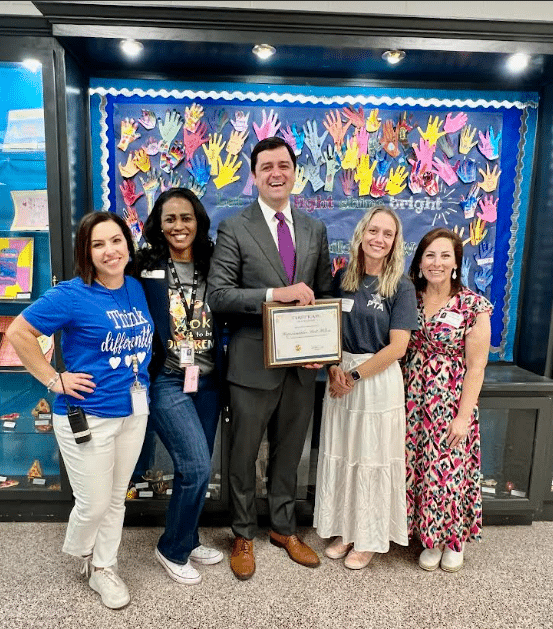
Simpson Elementary School celebrated Exceptional Children’s Week (ECW) last month with five days of special activities to recognize their special needs population and all of their exceptional students.
April 14–18 is set aside each year to celebrate children with disabilities, gifts and talents. This year’s ECW theme was Bridging Gaps and Building Futures, and the school was happy to take part.
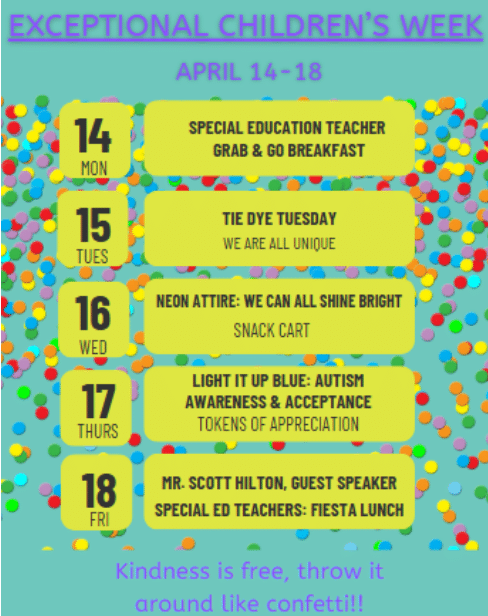
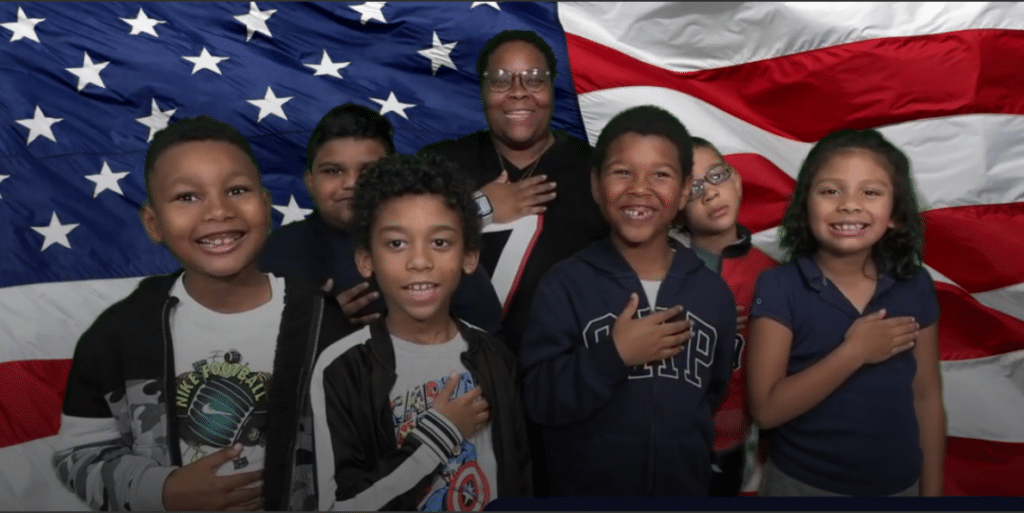
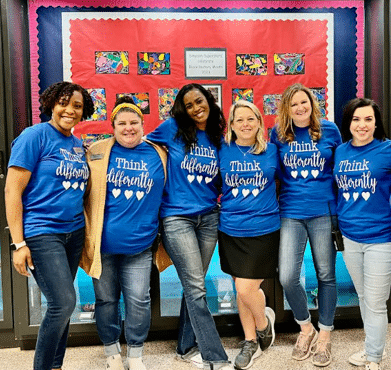
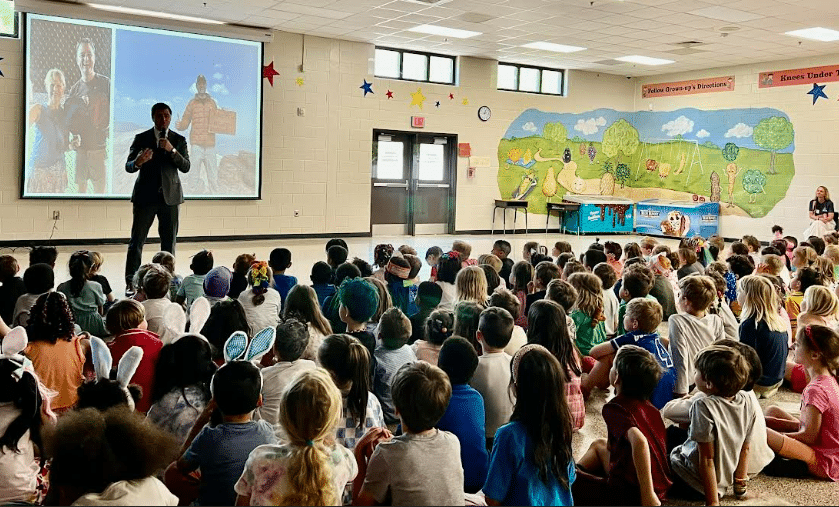
They highlighted each day of the week on the morning news with fun facts about notable people in society — and throughout history — who have overcome challenges with their disabilities, including actor Daniel Radcliffe (who has lived with dyspraxia for his entire life), Tom Cruise, Whoopi Goldberg, Frida Kahlo and Helen Keller.
Simpson Elementary’s technology team also pre-recorded various special needs classes reciting the Pledge of Allegiance every day of the week.
Guest speaker
To end their ECW with a bang, they invited former Simpson Elementary parent, State Representative Scott Hilton, to come in and speak to their K-2 classes about raising his son, Chase (who is autistic and now a student at Norcross High School), and how being different is okay.
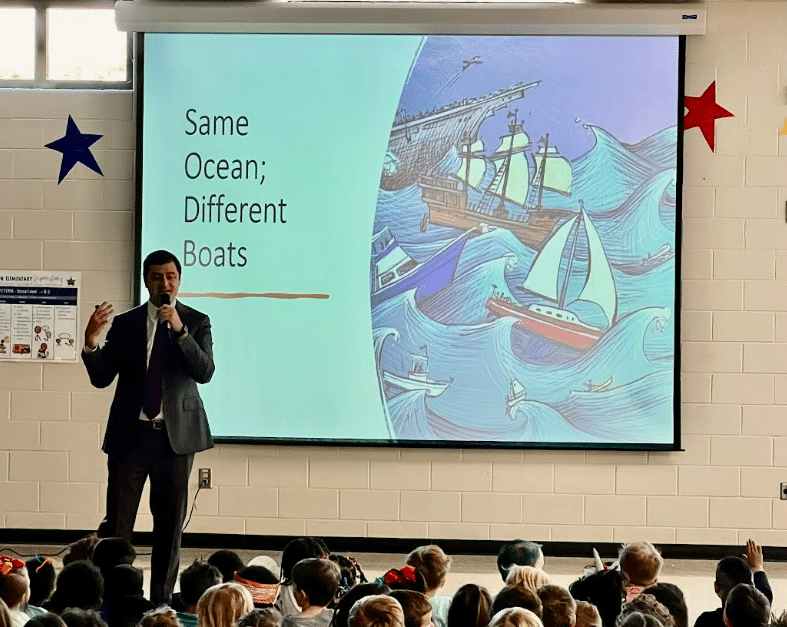
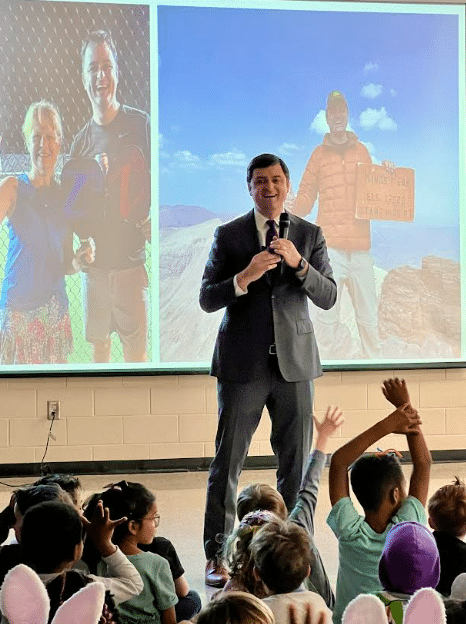
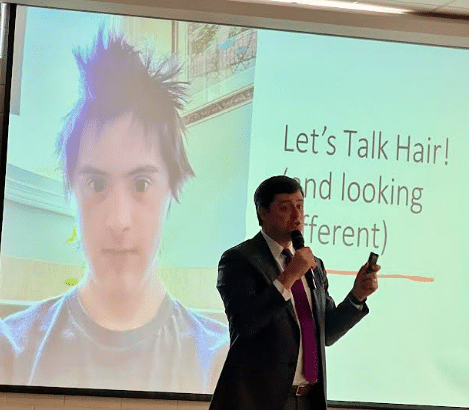
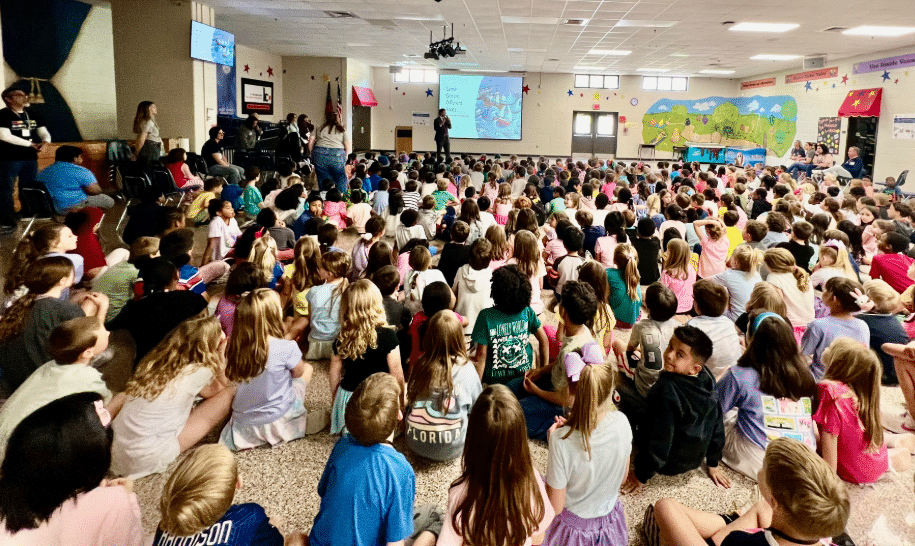
“Showing kindness and being inclusive is the best version of humanity,” said Dr. Taffeta Connery, Simpson Elementary School principal, in a statement about the event.
“Simpson Elementary has a special needs population of 214 (23%) of 946 students. [And] … we strive to ensure that our students are valued, recognized and instilled with high expectations for all.”
For more about Simpson Elementary, visit simpsones.gcpsk12.org.
Related
Education
Paul Duke STEM High School Student Earns CGO Scholarship
Published
1 week agoon
May 2, 2025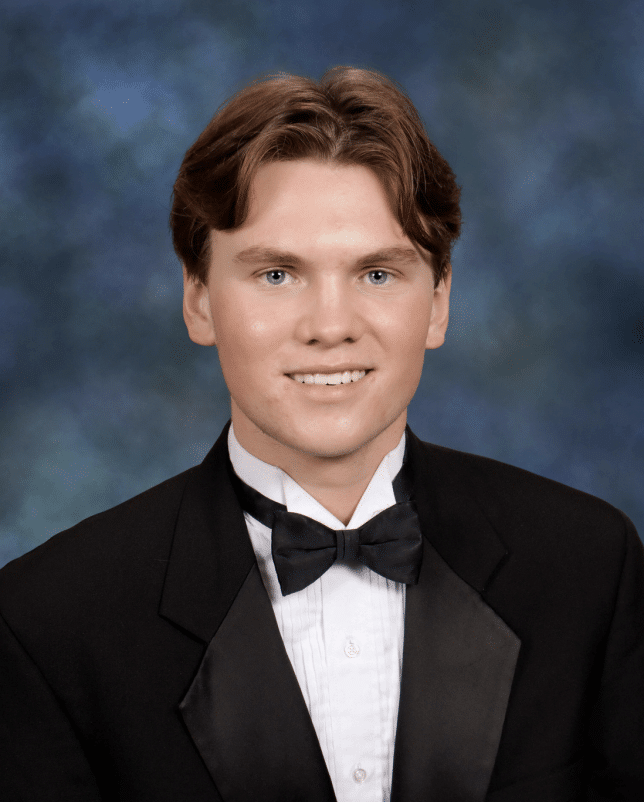
Cobb Global Outreach Inc. (CGO Inc.), a non-profit organization dedicated to enhancing financial literacy and educational opportunities, recently awarded three scholarships to metro Atlanta high school seniors, including one to Paul Duke STEM student, Baylor M. Brown.
The scholarship initiative underscores CGO Inc.’s commitment to empowering youth through financial education and support.
According to CGO’s social media pages, these outstanding students have shown incredible dedication and resilience in their academic journeys. “We are proud to support their continued success and look forward to seeing all that they will achieve!”
Scholarship details and impact
The scholarships provided by CGO Inc. are designed to alleviate financial barriers and encourage academic excellence among students pursuing higher education. Each scholarship recipient will receive financial assistance to support their educational endeavors, along with resources to enhance their understanding of financial management and literacy.
The scholarship recipients have demonstrated remarkable potential and a strong commitment to making a positive impact in their local community and beyond.
Bobby Cobb, CEO and founder of Cobb Global Outreach Inc., expressed enthusiasm about the partnership, stating, “We are honored to support the students … . By investing in their education and financial literacy, we aim to equip them with the skills necessary for a successful and financially secure future.”
Looking ahead
Cobb Global Outreach Inc. remains committed to expanding its scholarship programs and financial literacy initiatives. The organization plans to collaborate with additional schools and community partners to further its mission of closing the wealth gap and fostering economic empowerment among youth.
About Cobb Global Outreach Inc.
Founded in January 2021, Cobb Global Outreach Inc. is dedicated to educating middle and high school students about financial literacy. The organization believes that providing students with tools and resources related to financial literacy will help narrow the wealth gap and promote economic empowerment.
For more information, visit cobbglobaloutreachinc.com.
Related
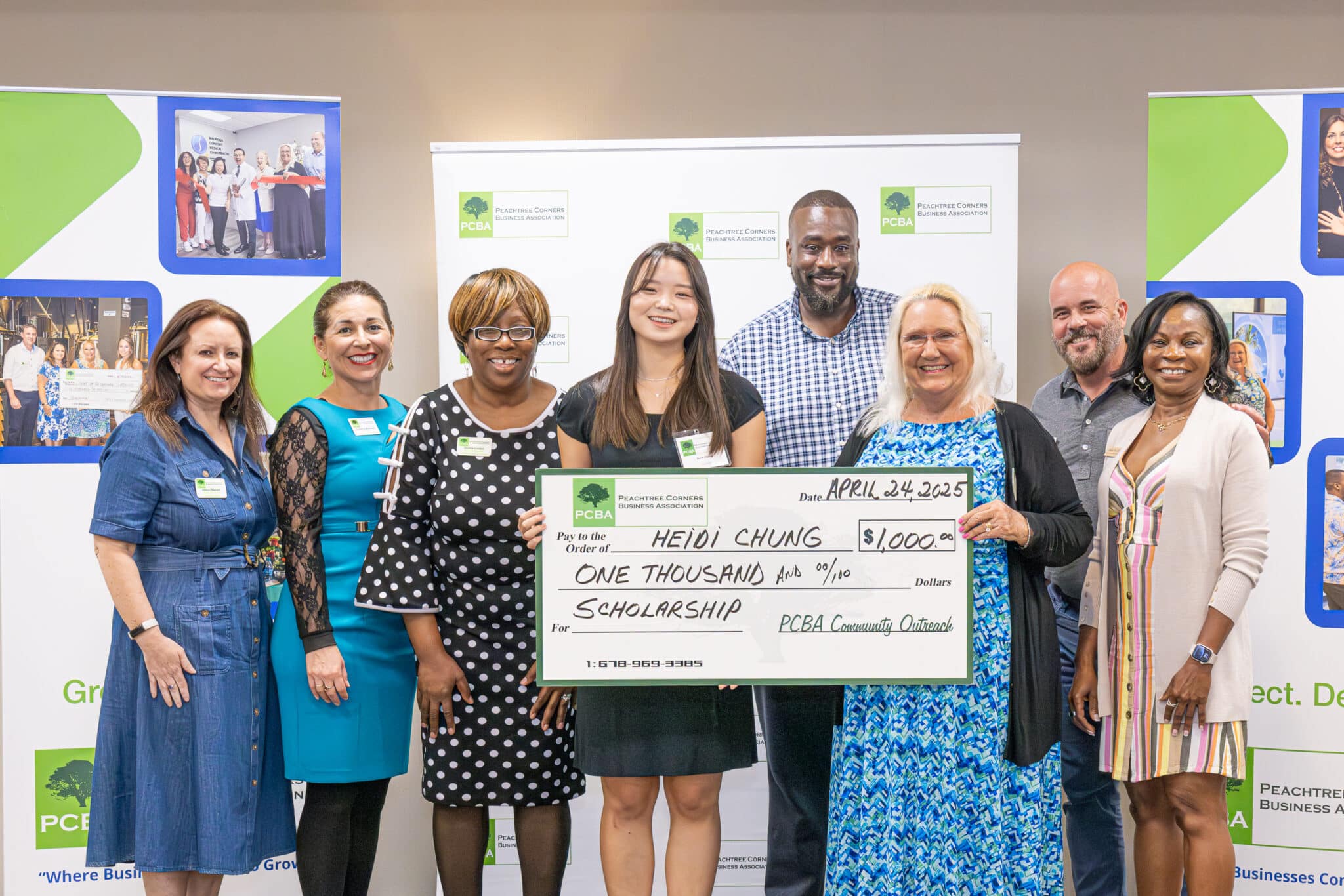
The Peachtree Corners Business Association (PCBA) awarded local high school senior, Heidi Chung, a $1,000 scholarship during their April 24 Business After Hours event. Heidi and her family were presented with the scholarship and introduced to the organization’s members and guests at the monthly gathering.
Heidi was accepted by several colleges and has selected the University of Kentucky to continue her education, pursuing a degree in nursing. When asked what lessons she has learned from her experiences volunteering and serving in the community throughout her life, Heidi commented, “I have learned that true leadership is about service, taking initiative and persevering through challenges.”
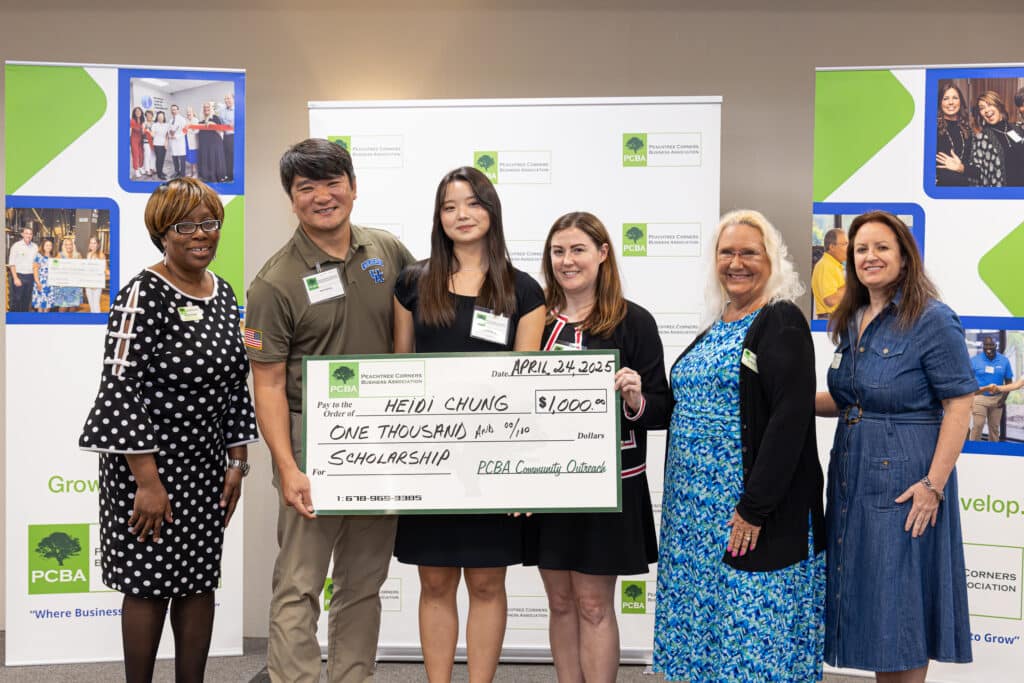
Scholarship Chair Donna Linden and Outreach Director Suzanna Martinez shared that the scholarship committee was impressed with Heidi’s many accomplishments, “whether she was organizing fundraisers, leading performance groups or helping athletes recover from injuries, Heidi demonstrated a positive impact on the community, as well as outstanding academic results.”
Funds for the PCBA Community Outreach Program are raised throughout the year from PCBA membership, sponsorship and an annual charity event. Donations and scholarships are awarded at PCBA’s monthly events so that members have the opportunity to learn more about the individuals and organizations.
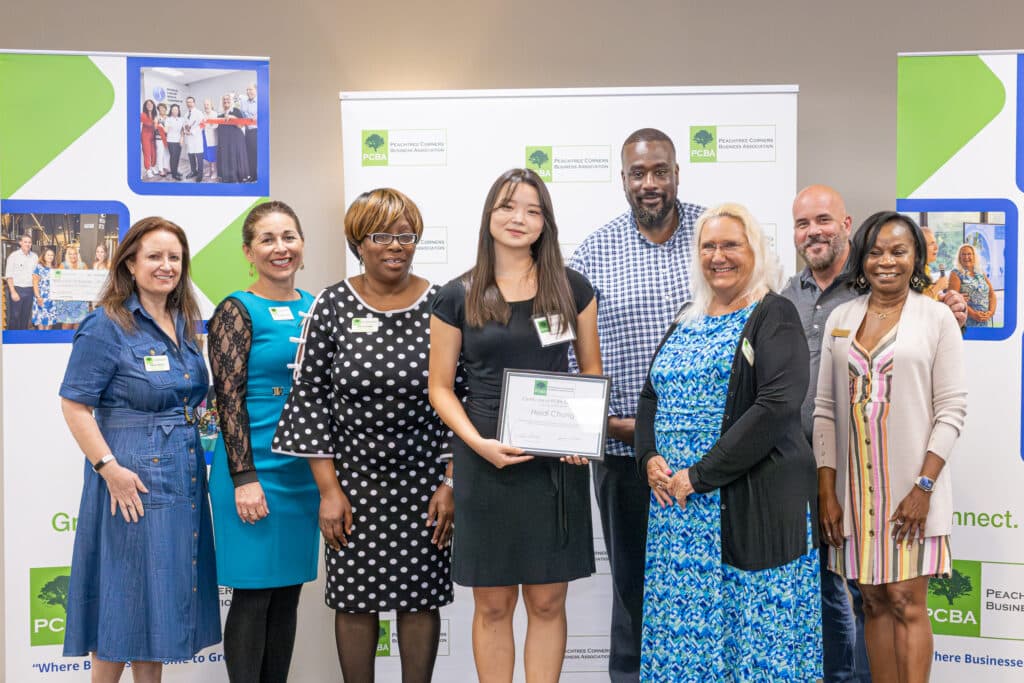
“We are so proud that the PCBA has … awarded 20 scholarships to outstanding future business leaders and donated in excess of $173,000 into our metro Atlanta community over the last 13 years,” stated Lisa Proctor, PCBA board president.
About Peachtree Corners Business Association
“Where Businesses Come to Grow,” the Peachtree Corners Business Association is a business membership organization that focuses on innovative approaches, programs, shared resources, community outreach and opportunities for member businesses and professionals to connect, develop, grow and prosper.
The PCBA is made up of businesses of all sizes and types who want to expand their reach and grow their business within Peachtree Corners and the greater metro Atlanta area.
For more information, call 678-969-3385, email membership@peachtreecornersba.com or visit peachtreecornersba.com.
Related
Read the Digital Edition
Subscribe
Keep Up With Peachtree Corners News
Join our mailing list to receive the latest news and updates from our team.
You have Successfully Subscribed!

Katherine Lafourcade — A Journey of Passion, Resilience and Giving Back

Digital Edition

PCBA Announces 2025 Scholarship Winner

Official City Merchandise Line Debuts This Saturday at Town Green

Paul Duke STEM High School Student Earns CGO Scholarship

World Blood Donor Day Starts Here: Theo’s Miracle, Katherine’s Mission [Podcast]

Executive Function: A Tribute to Working Moms

Peachtree Corners Grows Business Opportunities Through Economic Development

City of Peachtree Corners Awarded Certificate of Achievement From GFOA for Seventh Straight Year

Simpson Elementary Marks Exceptional Children’s Week

Executive Function: A Tribute to Working Moms

Official City Merchandise Line Debuts This Saturday at Town Green

Peachtree Corners Grows Business Opportunities Through Economic Development

Digital Edition

World Blood Donor Day Starts Here: Theo’s Miracle, Katherine’s Mission [Podcast]

Paul Duke STEM High School Student Earns CGO Scholarship

Light up the Corners [Video]

Capitalist Sage: Business Leadership in Your Community [Podcast]

Cliff Bramble: A Culinary Adventure through Italy

Top 10 Brunch Places in Gwinnett County

A Hunger for Hospitality

THE CORNERS EPISODE 3 – BLAXICAN PART 1

Top 10 Indoor Things To Do This Winter

The ED Hour: What it takes to Remove Barriers from Education






